Through immersion in a six-week experiential learning program, students learn the fundamentals of Preservation Archaeology, museum curation, archaeological survey, experimental archaeology, and archaeological research design and implementation. Together, students and staff explore diverse ways of sharing our research results with professionals, host communities, and the broader public and consider how various communities value archaeology and history. Students are full participants in fieldwork, laboratory analysis, and write-up activities contributing to our project’s research corporate groups, extended-family households who cooperated for activities like growing crops and maintaining irrigation systems.
Field school participants may choose to earn 7 upper-division undergraduate or graduate credits through the University of Arizona or WNMU. Students participate in archaeological survey, museum curation, laboratory analysis of museum collections, experimental archaeology, and carry out an independent research project to achieve the following course objectives:
- Understand the principles of preservation archaeology and its role in shaping past and present research in the Southwest
- Acquire and apply the basic skills of archaeological survey, laboratory analysis, and museum curation
- Understand and discuss the physical and social landscape of the archaeological sites on which we work and their relationship to broader issues in Southwestern archaeology
- Develop working strategies and write notes and reports that apply the logic of archaeological thinking to fieldwork, laboratory analysis, and applying the data we gather to answering anthropological questions
- Think critically about issues of archaeological ethics and the value of archaeology for various communities
- Acquire and demonstrate personal skills in teamwork, collaboration, and leadership vital to working as part of a research team
- Participate in local community outreach events and learn to communicate scientific information to a range of different audiences
Students work in small groups throughout the program, rotating through training modules that offer different but complementary skill sets. Students learn museum curation and collections management procedures by cataloging and rehousing an important collection. Survey training emphasizes how to recognized and document archaeological sites and assess their condition. An experimental archaeology module includes activities such as building a replica pueblo structure and tutorials on flintknapping and atlatl-throwing. Lectures, field trips, and public events expand these essential skills and present real-world opportunities to practice the principles of Preservation Archaeology.
Our days off include field trips to nearby archaeological and historic sites. Past field seasons have generally included visits to other archaeological field schools in the area, national parks and monuments (El Morro National Monument, and Chaco Canyon), and Native American communities (including museums and repositories at the Tohono O’odham Cultural Center and the Pueblos of Zuni and Acoma). These trips provide insights into the broader context of our field work within Southwestern archaeology, and the ways in which local and descendant communities connect with archaeological sites, museum collections, and research.
